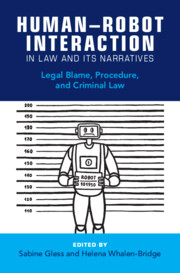Book contents
- Frontmatter
- Dedication
- Contents
- Contributors
- Foreword
- Acknowledgments
- Table of Cases
- Table of Statutes
- Table of Council of Europe Instruments
- Table of Other Council of Europe Materials
- Table of European Union Instruments
- Table of Other European Union Materials
- Table of Other Materials
- Abbreviations
- Introduction
- Part I Human–Robot Interactions and Substantive Law
- Part II Human–Robot Interactions and Procedural Law
- 5 Introduction to Human–Robot Interaction and Procedural Issues in Criminal Justice
- 6 Human Psychology and Robot Evidence in the Courtroom, Alternative Dispute Resolution, and Agency Proceedings
- 7 Principles to Govern Regulation of Digital and Machine Evidence
- 8 Robot Testimony?
- 9 Digital Evidence Generated by Consumer Products
- 10 Data as Evidence in Criminal Courts
- 11 Reconsidering Two US Constitutional Doctrines
- Part III Human–Robot Interactions and Legal Narrative
- Index
10 - Data as Evidence in Criminal Courts
Comparing Legal Frameworks and Actual Practices
from Part II - Human–Robot Interactions and Procedural Law
Published online by Cambridge University Press: 03 October 2024
- Frontmatter
- Dedication
- Contents
- Contributors
- Foreword
- Acknowledgments
- Table of Cases
- Table of Statutes
- Table of Council of Europe Instruments
- Table of Other Council of Europe Materials
- Table of European Union Instruments
- Table of Other European Union Materials
- Table of Other Materials
- Abbreviations
- Introduction
- Part I Human–Robot Interactions and Substantive Law
- Part II Human–Robot Interactions and Procedural Law
- 5 Introduction to Human–Robot Interaction and Procedural Issues in Criminal Justice
- 6 Human Psychology and Robot Evidence in the Courtroom, Alternative Dispute Resolution, and Agency Proceedings
- 7 Principles to Govern Regulation of Digital and Machine Evidence
- 8 Robot Testimony?
- 9 Digital Evidence Generated by Consumer Products
- 10 Data as Evidence in Criminal Courts
- 11 Reconsidering Two US Constitutional Doctrines
- Part III Human–Robot Interactions and Legal Narrative
- Index
Summary
Digital traces that people leave behind can be useful evidence in criminal courts. However, in many jurisdictions, the legal provisions setting the rules for the use of evidence in criminal courts were formulated long before these digital technologies existed, and there seems to be an increasing discrepancy between legal frameworks and actual practices. This chapter investigates this disconnect by analyzing the relevant legal frameworks in the EU for processing data in criminal courts, and comparing and contrasting these with actual court practices. The relevant legal frameworks are criminal and data protection law. Data protection law is mostly harmonized throughout the EU, but since criminal law is mostly national law, this chapter focuses on criminal law in the Netherlands. We conclude that existing legal frameworks do not appear to obstruct the collection of data for evidence, but that regulation on collection in criminal law and regulation on processing and analysis in data protection law are not integrated. We also characterize as remarkable the almost complete absence of regulation of automated data analysis – in contrast with the many rules for data collection.
- Type
- Chapter
- Information
- Human–Robot Interaction in Law and Its NarrativesLegal Blame, Procedure, and Criminal Law, pp. 221 - 252Publisher: Cambridge University PressPrint publication year: 2024
- Creative Commons
- This content is Open Access and distributed under the terms of the Creative Commons Attribution licence CC-BY-NC 4.0 https://creativecommons.org/cclicenses/

